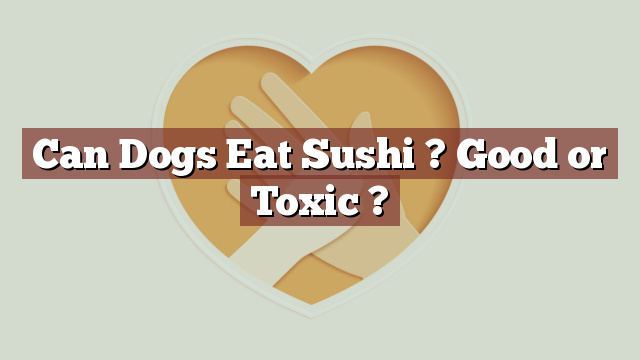Can Dogs Eat Sushi? Good or Toxic?
As responsible pet owners, it is crucial to be aware of what foods are safe for our furry friends. Sushi, a popular Japanese delicacy, has gained worldwide popularity and might seem tempting to share with our dogs. However, it is important to understand whether sushi is suitable for canine consumption. In this article, we will explore the nutritional value of sushi for dogs, determine its safety and potential toxicity, discuss any risks or benefits, and provide steps to take if your dog happens to eat sushi.
Nutritional Value of Sushi: What Does it Offer Dogs?
Sushi is typically composed of various ingredients such as rice, seaweed, fish, and occasionally vegetables. These components individually hold their own nutritional value. For instance, rice provides carbohydrates for energy, while seaweed contains essential minerals like iodine and iron. Fish, which is often the primary ingredient in sushi, is a great source of protein, omega-3 fatty acids, and essential vitamins.
Can Dogs Eat Sushi? Determining Safety and Toxicity
Can dogs eat sushi? The answer is not as straightforward as we might hope. While some components of sushi can be beneficial for dogs, others may pose risks. It is widely agreed upon by veterinary professionals that sushi should not be a regular part of a dog’s diet. Fish used in sushi may contain bones, which can cause choking hazards or damage the digestive tract if ingested by dogs. Moreover, certain types of fish, such as raw salmon or tuna, may contain parasites or harmful bacteria that can lead to foodborne illnesses in dogs.
Potential Risks or Benefits of Dogs Consuming Sushi
When considering the risks and benefits of dogs consuming sushi, it is crucial to assess the specific ingredients and preparation methods. Raw fish commonly used in sushi can contain high levels of mercury, which can be toxic to dogs when consumed in excess. Additionally, the high sodium content present in soy sauce, a common condiment for sushi, can be harmful to dogs, potentially leading to salt poisoning.
On the flip side, if sushi is prepared without any harmful ingredients or excessive seasonings, and the fish is thoroughly cooked, it may provide certain health benefits for dogs. Cooked fish can be a good source of lean protein and omega-3 fatty acids, which contribute to healthy skin, coat, and overall well-being. However, it is important to note that the potential benefits can be obtained through safer alternatives, specifically formulated for canine nutrition.
What to Do if Your Dog Eats Sushi: Steps to Take
If your dog happens to eat sushi, it is essential to take immediate action. First and foremost, do not panic. Assess the situation and determine if your dog has ingested any bones or harmful ingredients. If you suspect that your dog has consumed raw or spoiled fish, or if they are experiencing any symptoms such as vomiting, diarrhea, or abdominal pain, seek veterinary assistance promptly. A veterinarian will be able to provide proper guidance and potentially administer any necessary treatments.
Conclusion: Is Sushi Safe for Dogs? Considerations for Responsible Pet Owners
In conclusion, sushi should not be considered a safe food for dogs. While certain components of sushi can offer nutritional benefits, the potential risks of consuming raw fish, bones, and high sodium content outweigh the possible advantages. As responsible pet owners, it is crucial to prioritize our dogs’ health and well-being by providing them with a balanced and appropriate diet specifically designed for their nutritional needs. If you have any doubts or concerns about your dog’s diet or their consumption of any specific food, it is always best to consult with a qualified veterinarian.
Thank you for investing your time in exploring [page_title] on Can-Eat.org. Our goal is to provide readers like you with thorough and reliable information about various dietary topics. Each article, including [page_title], stems from diligent research and a passion for understanding the nuances of our food choices. We believe that knowledge is a vital step towards making informed and healthy decisions. However, while "[page_title]" sheds light on its specific topic, it's crucial to remember that everyone's body reacts differently to foods and dietary changes. What might be beneficial for one person could have different effects on another. Before you consider integrating suggestions or insights from "[page_title]" into your diet, it's always wise to consult with a nutritionist or healthcare professional. Their specialized knowledge ensures that you're making choices best suited to your individual health needs. As you navigate [page_title], be mindful of potential allergies, intolerances, or unique dietary requirements you may have. No singular article can capture the vast diversity of human health, and individualized guidance is invaluable. The content provided in [page_title] serves as a general guide. It is not, by any means, a substitute for personalized medical or nutritional advice. Your health should always be the top priority, and professional guidance is the best path forward. In your journey towards a balanced and nutritious lifestyle, we hope that [page_title] serves as a helpful stepping stone. Remember, informed decisions lead to healthier outcomes. Thank you for trusting Can-Eat.org. Continue exploring, learning, and prioritizing your health. Cheers to a well-informed and healthier future!

